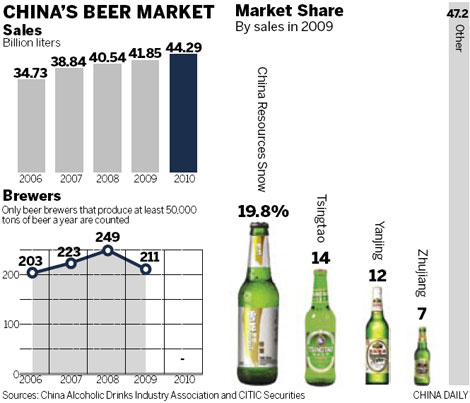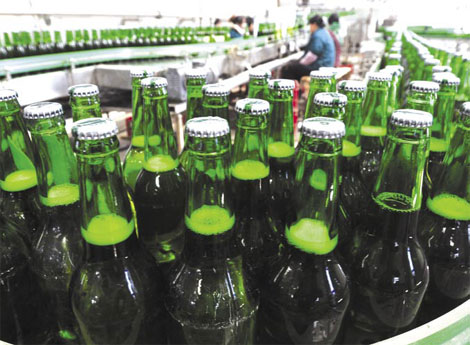Business
No fizzle in sight
Updated: 2011-03-29 10:29
By Lian Mo (China Daily)
|
Mergers and acquisitions are commonplace in China's beer market as large brewers from home and abroad step up efforts to vie for the low-end market. Dong Naide / For China Daily |
China's beer market continues to grow as the industry consolidates
BEIJING - Last month, beer industry giants Anheuser-Busch InBev and China Resources Snow Breweries (CRB) moved to tighten their grip on the market. AB InBev purchased Dalian Daxue Brewery, one of the top three players in Northeast China's Liaoning province, while CRB, in which London-based SABMiller has a stake, said it had obtained Jiangsu Santai Beer's trademark and marketing channels.
But in a bubbling industry aiming to become one of the world's biggest beer markets, the news caused no ripples.
China's beer industry has recorded profit growth of up to 494 percent in the past five years, figures from the China Alcoholic Drinks Industry Association (CADA) show, and the booming market is attracting huge attention and investment from foreign breweries.
New projects and market consolidation have helped form the sector's 8 billion-liter production capability every year on average in the past three to five years alone, said He Yong, secretary-general of CADA's beer branch.
Total sales in China's beer market hit 44.29 billion liters in 2010, about 24 percent of the world's total volume, according to global market research firm Euromonitor International.
China is considered the world's biggest beer consumption market, with sales nearly double that of the United States, the second biggest beer market.
"Still, beer consumption per person per year in China is about 33 liters, which is far from that of the US and Europe," He said.
"The amount is more than 100 liters in the US and even hit 180 liters in northern Europe.
"Because of cultural differences, China may not be able to reach the consumption levels of the West, but the market potential is still very large."
China's beer market will continue to increase by 6 to 7 percent in the next five years, Euromonitor forecast.
In contrast, Western beer markets have been shrinking after the financial crisis.
CRB, Tsingtao and Yanjing Beer used to be the three biggest players in the Chinese market, whose main companies are either wholly domestic or have domestic stock holders with controlling shares. Foreign brewers in China are only considered to hold an advantage in premium beers.
But foreign breweries such as AB InBev are starting to make headway. Last year, AB InBev's market share grew to 11 percent, surpassing Yanjing's 9.7 percent.
Guo Enya, corporate affairs director of AB InBev China, said the acquisition of Dalian Daxue Brewery is part of AB InBev's strategy to increase its footprint in China and will support "continued, sustainable growth with an optimized brand portfolio".
Miguel Patricio, president of AB InBev Asia-Pacific, said: "It is a symbol of our long-term commitment to China, the world's largest volume and fastest-growing beer market. This acquisition will complement our existing presence in China and bolster our position in Liaoning province, China's fourth-largest province in terms of beer consumption."
Wang Renrong, deputy president of AB InBev Asia-Pacific, said AB InBev has already invested more than $3 billion in China and has 33 breweries here.
AB InBev has also signed agreements with Yingkou, Liaoning province, in January and Xinxiang, Central China's Henan province, in November, to build new breweries with a total investment of 5.2 billion yuan ($792 million).
"Foreign brewers normally have better brand images, stronger financial backing and more efficient working styles than domestic ones," said Joy Huang, analyst of Euromonitor.
"But they lack distribution channels and production facilities in China.
"Foreign brewers concentrated on premium beers in the past, but more than 85 percent of the beer sales were from 'economy brands' in China."
Euromonitor considers many aspects to classify beers, including brand image and brewery location, but generally it regards beer costing lower than 7 yuan per liter as "economy" products.
"To get rid of the limitation to premium beers and grab bigger share, several main foreign brewers have purchased or launched regional standard and economy beer brands to explore distribution channels and increase their production capability," she said.
To that effect, Danish brewing giant Carlsberg bought a 12.25 percent share of Chongqing Brewery Co in November with 2.39 billion yuan, which is 8.6 percent higher than the market price, and became the leading shareholder of Chongqing Brewery with 29.71 percent shares.
"Of all the growth in the global beer market over the next five years, the majority will come from Asia and particularly China," Jorn Jensen, chief financial office of Carlsberg, was quoted by the Financial Times as saying.
"We want to expand our platform in Asia and we're particularly looking at China and Indo-China."
Molson Coors, which has operations in the UK, also paid $40 million to establish a joint venture with Sihai Beer Co in Northeast China and acquired its controlling stake in May.
Kandy Anand, president of Molson Coors International, views China as one of the prime expansion markets in the world for Coors Light, its flagship brand.
He told The Denver Post: "We want to select attractive markets where we can make an impact and China is clearly our focus area.
"The growth strategy is to make a relatively modest initial investment in brewing capacity at one facility and then expand as sales grow."
Zhang Jinzhi, chairman of Molson Coors China, said Sihai beer's production facility will push the sales growth of Coors Light to 50 percent from the present 35 percent.
Heineken-APB (China) Pte Ltd, in which Asia-Pacific Breweries Ltd holds a 50 percent interest, also has several premium beer brands in China, including Heineken and Anchor.
But the company decided to launch economy brand Anchor Shun Shuang in Guangzhou, South China's Guangdong province, through its subsidiary Guangzhou Asia-Pacific Brewery Co Ltd at the end of 2009.
"The sales of Anchor Shun Shuang have so far exceeded our expectations," said Melvyn Ng, general manager of Guangzhou Asia-Pacific Brewery.
"It is a mainstream offering in the Anchor family and plays a pivotal role in improving our portfolio that also comprises internationally renowned brands."
"Freshness is the most important quality of beers, so the local producers are likely to monopolize the market," He Yong, of the China Alcoholic Drinks Industry Association, said.
That is also why the Chinese beer market has seen so many acquisitions and new projects, with breweries needing production facilities at local areas, he said.
"However, after the years of mergers and acquisitions, there are not many resources left in the industry it may be harder to grab beer market share in future," he said.
China Daily

Specials

Tea-ing up
More turning to Chinese tea for investment opportunities like vintage wine

A cut above
The ancient city of Luoyang is home to a treasure trove of cultural wonders.

Rise and shine
The Chinese solar energy industry is heating up following recent setbacks in the nuclear sector
